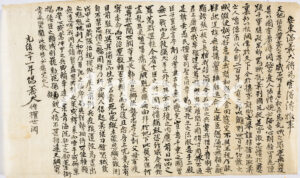Gwon Se-yeon (1864–1908), a righteous army commander during the late Korean Empire, fought against Japanese invasion as an independence activist.
He raised an army in 1907 during the *Jeongmi Uibyeong* (Righteous Army Uprising) and led armed resistance in the Jeolla region. Centering his operations around the Jirisan Mountain area, he engaged in several battles with the Japanese forces.
In 1908, he was captured by the Japanese army and died a martyr for his country. In 1963, the South Korean government awarded him the Order of Merit for National Foundation (Independence Medal).
Translation:
The Commander of the Andong Righteous Army Sends a Call to Arms
The heavens and the earth have set their order, and the division between civilization and the barbarians cannot be escaped. History remains clear, and the sins of traitors cannot go unpunished. When a nation faces unbearable disgrace, the people naturally rise in fury with the will to seek revenge.
When Ho Jeon risked his life and sent memorials despite being far away, and when Yan Gaoqing rebuked enemies with righteousness, nations followed their lead. These examples of righteous indignation stirred within their hearts, holding firm to the principles of justice in the world. In this moment, too, when it comes to driving out the traitors and punishing the enemies, many of us are choosing death over life in the name of righteousness.
Ah! These Japanese scoundrels, for two hundred years they sent tribute to us, and for four hundred years, we have ground our teeth at the thought of them. Even if they come to us now with sincerity, pleading for peace, we would still wish to see them destroyed and find it unbearable to even look upon them. How dare they act with such insolence, scheming deceitfully without cause?
They have colluded with exiled traitors and incited bandits, exaggerating their strength in a single skill to break our morale, and they have oppressed our five divisions, binding our hands and feet. They threaten our king, execute our ministers, and demand that their emperor’s name be used as a title of honor. They aim to drive a wedge between us and China while offering only token aid. They trample on the legacies of past kings, destroying the traditions established by our forefathers. The hand of evil reaches into the palace—how can any loyal subject bear such humiliation?
The razor that will cut our hair is upon the chopping block, and no precedent for such disgrace exists in history. Who could have imagined that a once-great nation would fall without even fighting a single battle, left at the mercy of pigs and dogs, because of the extreme evil of traitors? The crimes of the Four Villains of ancient times pale in comparison to the sins of the Ten Ministers today. They plot to shave the heads of our people under the guise of royal orders, and it is truly unbearable. If we do not eliminate these fiends, how will we face our ancestors in the afterlife? If I cannot save my own head, how can I continue to live in this world with any sense of dignity?
Se-yeon and others grew up in a land of civilization, learning the teachings of loyalty and filial piety. When parents fall ill, how could one only think of one’s own honor and not act to help? Though our fortune may seem dim, with Heaven’s favor, we may yet prevail.
Moreover, when thinking about one’s future, it is clear that there are fates far worse than death. If living brings no honor, how could it compare to dying with righteousness? Though I did not receive an official command from the king, I could not contain my righteous anger and gathered the villagers to raise an army. The swords and spears that were kept hidden since the Year of the Ox have now been brought forth. We modeled the size of our forces after the precedents of the Imjin Year, when we fought against invaders.
Though our soldiers are weary and provisions scarce, the enemy will seem like demons in broad daylight, while we, with the advantage of terrain and unity, will be like tigers on a hill. If we combine our strength and will, we can surely wipe them out to the last.
Ah! My comrades, will you not discuss a good plan? Some will throw down their plows, rubbing their hands together in readiness. Others will strike their desks with their swords, making solemn oaths in their hearts. Some will wear armor under their robes, while others will transport supplies with carts. We will wash our swords at the Cheonghae River and hang the heads of traitors in the alleys of their dwellings. Success will bring us great honor, and even in death, we will have righteous souls. Ah! Humanity is fundamentally the same everywhere, and the principles of justice cannot fall to the ground forever. When people hear the contents of this letter, there will surely be those who weep bitterly.
On a day in December, the Year of Eulmi (1895),
Commander of the Righteous Army in Andong, Gwon Se-yeon, sends this call to arms.”

